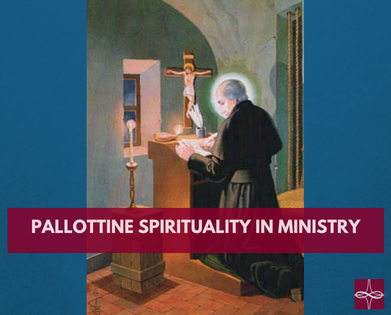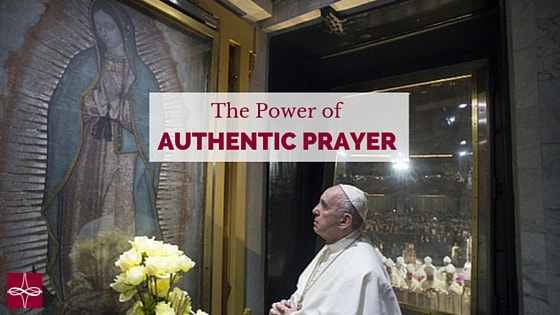|
Ever struggle with attempting to find God in your daily life? Do you ever feel that you are just so busy that engaging in a personal relationship with the Lord seems out of the question? Do you struggle in attempting to recognize how God is acting in your life, at work, or in the classroom? I promise, you are not alone. Many of us struggle with finding God not only in the ordinary, but also in our busy lives. Different saints, such as St. Francis de Sales, even recognized how at times it can be challenging to find God’s presence in the ordinary. Surprising right?! Sometimes, it seems so difficult to find God in the mundane or in the office. Yet, this is exactly where we can find God’s presence—in the ordinary!
St. Francis De Sales, a Doctor of the Church and inspiration of the ever popular Salesian Spirituality, wrote in his famed Introduction to the Devout Life that “It is an error, or rather a heresy, to wish to banish the devout life from the regiment of soldiers, the mechanic’s shop, the court of princes, or the home of married people… Wherever we may be, we can and should aspire to a perfect life.” St. Francis De Sales advocates the notion that everyone is called to be in relationship with God no matter their specific state in life. For St. Francis De Sales, the soldier, the mechanic, the government officials, and the married couple—any lay person—can find God in the ordinary. God meets each of us were we are; his presence is not restricted to a building. Nevertheless, what are some practical ways in which we can find God in the ordinary? Again, St. Francis de Sales has more wisdom for us from his Introduction to the Devout Life, writing that “occasions do not often present themselves for the exercise of fortitude, magnanimity, and great generosity, but meekness, temperance, integrity, and humility are virtues that must mark all our actions in life.” When we refrain from boasting about our accomplishments in the office or when we refrain from lying to our professor regarding a string of absences from class, we are encountering God in the ordinary. When we simply take a minute in the beginning of the morning and offer our day to God, we are encountering God in the ordinary. When we take a moment to recognize a coworker’s kindness to a stranger or a fellow student’s concern for a student falling behind in class, we are encountering God in the ordinary. Encountering God is not solely done on in the pews or on the mountaintop. Instead, we can encounter God in the ordinary, in our everyday life. To learn more about seeing God in the ordinary, please visit our Prayer Resources page by clicking here. **This post was originally published on 6/3/2021**
0 Comments
Ever struggle with attempting to find God in your daily life? Do you ever feel that you are just so busy that engaging in a personal relationship with the Lord seems out of the question? Do you struggle in attempting to recognize how God is acting in your life, at work, or in the classroom? I promise, you are not alone. Many of us struggle with finding God not only in the ordinary, but also in our busy lives. Different saints, such as St. Francis de Sales, even recognized how at times it can be challenging to find God’s presence in the ordinary. Surprising right?! Sometimes, it seems so difficult to find God in the mundane or in the office. Yet, this is exactly where we can find God’s presence—in the ordinary! St. Francis De Sales, a Doctor of the Church and inspiration of the ever popular Salesian Spirituality, wrote in his famed Introduction to the Devout Life that “It is an error, or rather a heresy, to wish to banish the devout life from the regiment of soldiers, the mechanic’s shop, the court of princes, or the home of married people… Wherever we may be, we can and should aspire to a perfect life.” St. Francis De Sales advocates the notion that everyone is called to be in relationship with God no matter their specific state in life. For St. Francis De Sales, the soldier, the mechanic, the government officials, and the married couple—any lay person—can find God in the ordinary. God meets each of us were we are; his presence is not restricted to a building. Nevertheless, what are some practical ways in which we can find God in the ordinary? Again, St. Francis de Sales has more wisdom for us from his Introduction to the Devout Life, writing that “occasions do not often present themselves for the exercise of fortitude, magnanimity, and great generosity, but meekness, temperance, integrity, and humility are virtues that must mark all our actions in life.” When we refrain from boasting about our accomplishments in the office or when we refrain from lying to our professor regarding a string of absences from class, we are encountering God in the ordinary. When we simply take a minute in the beginning of the morning and offer our day to God, we are encountering God in the ordinary. When we take a moment to recognize a coworker’s kindness to a stranger or a fellow student’s concern for a student falling behind in class, we are encountering God in the ordinary. Encountering God is not solely done on in the pews or on the mountaintop. Instead, we can encounter God in the ordinary, in our everyday life. To learn more about seeing God in the ordinary, please visit our Prayer Resources page by clicking here. During college, I had a professor with a reputation for being extremely challenging. Upperclassman students would warn us as freshman: “whatever you do, don’t take him! You will work more in his class than you ever have before!” I vividly recall one chilly, December afternoon walking by this professor’s office and watching students storm out from it, visibly angry. “Not good,” I thought to myself. It would certainly be easier to continue to breeze by in my classes than to be challenged. My senior year, against all advice, I decided to enroll in this professor’s class. The warnings from the upperclassmen were correct. He was difficult and challenged me to grow in my craft like no educator before had ever challenged me. And for that, I am forever thankful. How can you grow without being challenged? I am only the professional I am today because my professor was dissatisfied with the status-quo. He knew his curriculum would be difficult, but he believed that each of his students could achieve more, even though it was uncomfortable and challenging. He wanted us to excel rather than simply get by. As I reflect on Pope Francis’ upcoming 81st birthday and give thanks to God for his ministry, I see some similarities between him and my professor. One of our Holy Father’s greatest gifts to the people of God is that he challenges us to be uncomfortable with the status-quo, with “maintenance mode.” In Evangelii Gaudium, Pope Francis exclaims: “In our day Jesus’ command to ‘go and make disciples’ echoes in the changing scenarios and ever new challenges to the Church’s mission of evangelization, and all of us are called to take part in this new missionary ‘going forth’. Each Christian and every community must discern the path that the Lord points out, but all of us are asked to obey his call to go forth from our own comfort zone in order to reach all the ‘peripheries’ in need of the light of the Gospel.” Pope Francis, much like my professor in college, presents us with a challenge because he knows that the Church’s potential is incredible, even if this shift to mission mode is not easy. Convincing our colleagues and community to move from maintenance mode to mission mode, however, can be difficult. Some parish leaders I have encountered argue that their parish has always done something in a certain way and that if they changed it half of their parishioners would leave the parish. Nevertheless, in Evangelii Gaudium, Pope Francis reminds us that: “Pastoral ministry in a missionary key seeks to abandon the complacent attitude that says: ‘We have always done it this way’” (EG, no. 33). The only way that parishes will become missionary communities that are focused on going forth to form missionary disciples is by shedding their contentedness with the status-quo and aversion to conflict at all costs. Pope Francis continues, “the word of God constantly shows us how God challenges those who believe in him ‘to go forth.’” Let us then turn to God and his Word in order to have the courage to go forth! Moving from maintenance to mission will be uncomfortable, but, as Pope Francis prophetically reminds us, is our calling as followers of Jesus Christ. Please join me and the Catholic Apostolate Center team in wishing Pope Francis a very happy and blessed 81st birthday, which he will celebrate on December 17th! For more resources on Missionary Discipleship, please click here.  This past winter, as I knelt in prayer at the tomb of the Blessed Elisabetta Sanna, I experienced a great sense of peace. I also felt a profound connection to this holy woman, who is largely unknown in the United States. I was blessed to be in Rome on a pilgrimage with a few great friends during our university’s winter break. Before embarking on the pilgrimage, my thoughts chiefly centered on finishing final exams and looking forward to having the opportunity to pray with Pope Francis at St. Peter’s Basilica. This opportunity with the Holy Father ended up becoming a moment I will always treasure. Yet, as I reflect back on the pilgrimage, it is clear that my encounter with the Venerable Elisabetta Sanna in the small Church of San Salvatore in Onda left the greatest mark on my spiritual life. Born in 1788, Elisabetta Sanna grew up in Sardinia. When only three months old, Elisabetta contracted smallpox, a disease that left her physically handicap for the rest of her life. Despite her disability, Elisabetta married and had seven children. She became well known in her town for devoting herself to the catechetical education of youth. Elisabetta also educated women from the town in basic Christian doctrine. After her husband died in 1825, Elisabetta decided to make a pilgrimage to the Holy Land and entrusted her children to the care of her mother and brother. Though she started her pilgrimage, Elisabetta never made it to the Holy Land, instead going to Rome. It was in Rome that she met a humble priest with a bold vision proclaiming that all the baptized were called to be apostles. This priest, Fr. Vincent Pallotti, would become her spiritual director, as well as a saint. He was canonized on January 20th, 1963 by Pope John XXIII. While Elisabetta planned on returning to her children in Sardinia, her physical disability prevented her from travelling back. Hence, while understandably upset, Elisabetta remained in Rome and continued to selflessly serve others in collaboration with Fr. Vincent Pallotti. In addition to performing multiple works of mercy, such as visiting the terminally ill, Elisabetta’s life was rooted in prayer. Both Sacred Scripture and the Holy Mass gave her the ability to be the face of Christ to the marginalized. In other words, Elisabetta’s love for Jesus Christ, which was grounded in her personal prayer, impelled her to the apostolate. What I find so remarkable and inspiring about Elisabetta’s life is that her path towards holiness appears so un-extraordinary. She was not the founder of a religious community, nor did she author a great theological treatise. Yet, it is exactly the ordinariness of her life that makes her so extraordinary. Elisabetta’s life is important because it demonstrates that God calls each one of us, in whatever place, in whatever situation, to be apostles. If you begin to doubt your ability to do great things for Jesus, look to the example of Elisabetta. I invite you to pray for her intercession and ask her to assist you in living out your vocation to be an apostle. For more resources on the Blessed Elisabetta Sanna, click here. Editors Note: This blog post was originally published on July 7, 2016 and Elisabetta Sanna was beatified on September 17, 2016. I remember the first time I experienced Eucharistic Adoration. During my first week of college, I was walking back to my residence hall after grabbing dinner with some friends of mine. As we walked back into our dorm, one smiling upperclassmen was talking to some other freshman in the lobby. He saw us and made a beeline. I was only five steps away from the elevator, maybe he wouldn’t catch me. Alas, the elevator did not come in time and we ended up chatting with this friendly upperclassman. As he introduced himself, he also invited us to praise and worship Adoration that night. He promised us there would be a ton of good food afterwards. Though there were posters about this event throughout the dorm and we knew about it, we did not previously plan on attending. However, after being personally invited, being called by our names, we decided to give it a try. It was one friendly person’s invitation (and yes, the promise of food) which forever changed my faith-life. After going to Adoration and the fellowship held immediately afterwards with friends, I was hooked. College students and young adults are in a unique place in their faith journey. Many are seeking answers to some pretty big life questions. As the Church, we have the joy of being called to reach out to these sometimes marginalized members of our community and invite them to experience the love of Christ. Yet, how do we do that? As a college student myself and someone who ministers to undergraduate students, I have found that there is one way in which your parish can successfully engage Catholic young adults and college students. All college students and young adults seek a place to belong. And what better place is there than the Church of Jesus Christ? The parish community can seek to provide different opportunities for college students and young adults attending the parish to get together for fellowship. Having faithful Catholic friends your age who provide you with support on your spiritual journey is indispensable. The Christian life is not individualistic in nature, but one marked by interdependence. Being a parish which hosts events that foster communion between young adults is a key way to keep young adults engaged in parish life. Some parishes successfully do this by hosting mini-Theology on Tap series at a local restaurant, or something as simple as hosting praise and worship Adoration followed by a meal. These are just two examples of how you can help young adults feel like they belong in your parish community and experience Christian fellowship with their peers. One principle tip is to host events which have a liturgical aspect (pray compline together or have a holy hour) and a fellowship aspect (do not underestimate the power of food!). Yet, you might be thinking, there are no college students or young adults currently active in my parish! Pope Francis might have some wisdom to share with us. During Pope Francis’ journey to Brazil for World Youth Day in 2013, he told an assembly of bishops that "we cannot keep ourselves shut up in parishes, in our communities, when so many people are waiting for the Gospel.” Each baptized member of the parish community has a responsibility to be hospitable and welcoming. Each member of the parish community must be marked by their missionary zeal. Evangelization is not simply the job of the parish staff, but the calling and the joy of each Christian. Hence, it is your calling, not somebody else’s, to reach out to inactive college students or young adults and invite them back to the parish so that they can experience the love of Jesus Christ. This involves each person in the parish calling students by name. It was that simple invitation which brought me into regularly participating in the life of the Church. This responsibility, this call of each Christian to invite students and young adults by name, also becomes one of the greatest joys. *This post was originally published on our blog on April 14, 2016. Have you ever heard of St. Vincent Pallotti or Pallottine spirituality? If not, you are certainly not alone. Unfortunately, not many Catholics in North America have ever heard of St. Vincent Pallotti. As a lifelong Catholic, I myself was not introduced to St. Vincent and his spirituality until three years ago, which is unfortunate because Pallottine spirituality is a great gift to the Church. You may be wondering: what exactly is Pallottine spirituality and why is it important? While I could explain, I think our Holy Father does a much better job.
On October 10, 2016, during a private audience with members of the General Assembly of the Society of the Catholic Apostolate—the society of priests and brothers St. Vincent founded, Pope Francis stressed that, “in this Holy Year of Mercy, I like to remember that Vincent Pallotti was blessed to recognize that Jesus is the Apostle of the Father, rich in mercy and full of mercy. He is the one who fulfills its mission by revealing to everyone the tender love and the infinite mercy of the Father.” During the audience, Pope Francis also urged St. Vincent’s sons to continue their special mission to help Catholics “rediscover the immense love of God.” Pope Francis’ affirmation of the special mission of the Pallottines clearly demonstrates how necessary Pallottine spirituality is today. Additionally, our Holy Father also explained that one of the major aspects of Pallottine spirituality is rooted in a personal encounter with Christ’s infinite love and infinite mercy. The Holy Father said: “Your founder realized that in order to live in communion with God, Jesus Christ must be put at the center.” St. Vincent’s personal encounter with Jesus Christ’s infinite love and infinite mercy changed his life. It impelled him to action, to spread Christ’s love and mercy to everyone. St. Vincent spread Christ’s love by providing spiritual direction, spending hours in the confessional each week, promoting various Catholic devotions, and assisting all the baptized in coming to know their vocations to the apostolate. His encounter with Jesus Christ was truly at the center of his life. Like St. Vincent, a personal encounter with Christ can help us to revive our faith, rekindle charity, and assist all the baptized in understanding their vocations as apostles. Sounds pretty awesome right? I think so too. I will now explain three practical ways to infuse Pallottine spirituality into your ministry.
The need has never been so great; the task has never been so urgent. We all thirst to encounter God’s infinite love and infinite mercy. We all need St. Vincent Pallotti’s message and we can all work to spread it in our own ways. The question is—will you join us? For more resources on St. Vincent Pallotti and Pallottine spirituality, click here. This past winter, as I knelt in prayer at the tomb of the Venerable Elisabetta Sanna, I experienced a great sense of peace. I also felt a profound connection to this holy woman, who is largely unknown in the United States. I was blessed to be in Rome on a pilgrimage with a few great friends during our university’s winter break. Before embarking on the pilgrimage, my thoughts chiefly centered on finishing final exams and looking forward to having the opportunity to pray with Pope Francis at St. Peter’s Basilica. This opportunity with the Holy Father ended up becoming a moment I will always treasure. Yet, as I reflect back on the pilgrimage, it is clear that my encounter with the Venerable Elisabetta Sanna in the small Church of San Salvatore in Onda left the greatest mark on my spiritual life.
Born in 1788, Elisabetta Sanna grew up in Sardinia. When only three months old, Elisabetta contracted smallpox, a disease that left her physically handicap for the rest of her life. Despite her disability, Elisabetta married and had seven children. She became well known in her town for devoting herself to the catechetical education of youth. Elisabetta also educated women from the town in basic Christian doctrine. After her husband died in 1825, Elisabetta decided to make a pilgrimage to the Holy Land and entrusted her children to the care of her mother and brother. Though she started her pilgrimage, Elisabetta never made it to the Holy Land, instead going to Rome. It was in Rome that she met a humble priest with a bold vision proclaiming that all the baptized were called to be apostles. This priest, Fr. Vincent Pallotti, would become her spiritual director, as well as a saint. He was canonized on January 20th, 1963 by Pope John XXIII. While Elisabetta planned on returning to her children in Sardinia, her physical disability prevented her from travelling back. Hence, while understandably upset, Elisabetta remained in Rome and continued to selflessly serve others in collaboration with Fr. Vincent Pallotti. In addition to performing multiple works of mercy, such as visiting the terminally ill, Elisabetta’s life was rooted in prayer. Both Sacred Scripture and the Holy Mass gave her the ability to be the face of Christ to the marginalized. In other words, Elisabetta’s love for Jesus Christ, which was grounded in her personal prayer, impelled her to the apostolate. What I find so remarkable and inspiring about Elisabetta’s life is that her path towards holiness appears so un-extraordinary. She was not the founder of a religious community, nor did she author a great theological treatise. Yet, it is exactly the ordinariness of her life that makes her so extraordinary. Elisabetta’s life is important because it demonstrates that God calls each one of us, in whatever place, in whatever situation, to be apostles. If you begin to doubt your ability to do great things for Jesus, look to the example of Elisabetta. I invite you to pray for her intercession and ask her to assist you in living out your vocation to be an apostle. For more resources on the Venerable Elisabetta Sanna, click here. As I was walking down the sidewalk to my residence hall, I glanced at my watch and realized I had a busy night ahead. I still had class until the evening, had to eat dinner, meet with a resident, prepare for next Monday’s program about how faith enriches our relationships, and study for two exams the next day. When I unlocked the door to my room, I realized I had about fifteen minutes until my next class. I thought to myself that it would be a good time to quiet myself and pray. I decided it would be easier, since I was rushed, to quickly recite a couple of prayers rather than expend the necessary effort to examine my day or truly open my heart to God, the Infinite Love. My principle concern at that moment was to check daily prayer off my to-do list. I felt rather empty for the rest of the day and struggled in my ministerial responsibilities. I lacked authentic prayer in my day and it took its toll. While authentic prayer can be hard, especially for those of us involved in ministry, authentic prayer empowers us to fulfill the mission Christ entrusted to us. Yet, what exactly is authentic prayer?
During a homily in the chapel of the Santa Marta residence in 2013, Pope Francis stressed that “the Lord tells us: 'the first task in life is this: prayer.' But not the prayer of words, like a parrot; but the prayer, the heart: gazing on the Lord, hearing the Lord, asking the Lord.” Pope Francis astutely observed that authentic prayer is integrally connected to the heart, the Sacred Heart of Christ, and our own hearts. When we engage in authentic prayer, we are opening our hearts to the transforming infinite love and mercy of Jesus Christ. We are being honest with God about the desires of our own heart. While authentic prayer is certainly beneficial for our own selves, being practitioners of authentic prayer also is a gift to the entire Church. Others notice God using us sinful creatures as His instruments. Our lives become signs that point towards the Kingdom of God. Yet, we must each reflect on how tempting it is to imitate a parrot in our prayer. How often do we recite prayers to cross them off of our to-do list, having little faith that the Lord will answer them? Asking God to open our own hearts to His infinite love combats this temptation. If I had taken the time to really open my heart to God, to be honest in my prayer and not dress it up, I would not have struggled with my ministerial responsibilities. When we become men and women of authentic prayer, Christ transforms our hearts after His own heart. Thus, we are empowered by the Holy Spirit to be humble heralds of the infinite love and mercy of Jesus Christ. For more resources on prayer, click here. I remember the first time I experienced Eucharistic Adoration. During my first week of college, I was walking back to my residence hall after grabbing dinner with some friends of mine. As we walked back into our dorm, one smiling upperclassmen was talking to some other freshman in the lobby. He saw us and made a beeline. I was only five steps away from the elevator, maybe he wouldn’t catch me. Alas, the elevator did not come in time and we ended up chatting with this friendly upperclassman. As he introduced himself, he also invited us to praise and worship Adoration that night. He promised us there would be a ton of good food afterwards. Though there were posters about this event throughout the dorm and we knew about it, we did not previously plan on attending. However, after being personally invited, being called by our names, we decided to give it a try. It was one friendly person’s invitation (and yes, the promise of food) which forever changed my faith-life. After going to Adoration and the fellowship held immediately afterwards with friends, I was hooked. College students and young adults are in a unique place in their faith journey. Many are seeking answers to some pretty big life questions. As the Church, we have the joy of being called to reach out to these sometimes marginalized members of our community and invite them to experience the love of Christ. Yet, how do we do that? As a college student myself and someone who ministers to undergraduate students, I have found that there is one way in which your parish can successfully engage Catholic young adults and college students. All college students and young adults seek a place to belong. And what better place is there than the Church of Jesus Christ? The parish community can seek to provide different opportunities for college students and young adults attending the parish to get together for fellowship. Having faithful Catholic friends your age who provide you with support on your spiritual journey is indispensable. The Christian life is not individualistic in nature, but one marked by interdependence. Being a parish which hosts events that foster communion between young adults is a key way to keep young adults engaged in parish life. Some parishes successfully do this by hosting mini-Theology on Tap series at a local restaurant, or something as simple as hosting praise and worship Adoration followed by a meal. These are just two examples of how you can help young adults feel like they belong in your parish community and experience Christian fellowship with their peers. One principle tip is to host events which have a liturgical aspect (pray compline together or have a holy hour) and a fellowship aspect (do not underestimate the power of food!). Yet, you might be thinking, there are no college students or young adults currently active in my parish! Pope Francis might have some wisdom to share with us. During Pope Francis’ journey to Brazil for World Youth Day in 2013, he told an assembly of bishops that "we cannot keep ourselves shut up in parishes, in our communities, when so many people are waiting for the Gospel.” Each baptized member of the parish community has a responsibility to be hospitable and welcoming. Each member of the parish community must be marked by their missionary zeal. Evangelization is not simply the job of the parish staff, but the calling and the joy of each Christian. Hence, it is your calling, not somebody else’s, to reach out to inactive college students or young adults and invite them back to the parish so that they can experience the love of Jesus Christ. This involves each person in the parish calling students by name. It was that simple invitation which brought me into regularly participating in the life of the Church. This responsibility, this call of each Christian to invite students and young adults by name, also becomes one of the greatest joys. Ever struggle with attempting to find God in your daily life? Do you ever feel that you are just so busy that engaging in a personal relationship with the Lord seems out of the question? Do you struggle in attempting to recognize how God is acting in your life, at work, or in the classroom? I promise, you are not alone. Many of us struggle with finding God not only in the ordinary, but also in our busy lives. Different saints, such as St. Francis de Sales, even recognized how at times it can be challenging to find God’s presence in the ordinary. Surprising right?! Sometimes, it seems so difficult to find God in the mundane or in the office. Yet, this is exactly where we can find God’s presence—in the ordinary! St. Francis De Sales, a Doctor of the Church and inspiration of the ever popular Salesian Spirituality, wrote in his famed Introduction to the Devout Life that “It is an error, or rather a heresy, to wish to banish the devout life from the regiment of soldiers, the mechanic’s shop, the court of princes, or the home of married people… Wherever we may be, we can and should aspire to a perfect life.” St. Francis De Sales advocates the notion that everyone is called to be in relationship with God no matter their specific state in life. For St. Francis De Sales, the soldier, the mechanic, the government officials, and the married couple—any lay person—can find God in the ordinary. God meets each of us were we are; his presence is not restricted to a building. Nevertheless, what are some practical ways in which we can find God in the ordinary? Again, St. Francis de Sales has more wisdom for us from his Introduction to the Devout Life, writing that “occasions do not often present themselves for the exercise of fortitude, magnanimity, and great generosity, but meekness, temperance, integrity, and humility are virtues that must mark all our actions in life.” When we refrain from boasting about our accomplishments in the office or when we refrain from lying to our professor regarding a string of absences from class, we are encountering God in the ordinary. When we simply take a minute in the beginning of the morning and offer our day to God, we are encountering God in the ordinary. When we take a moment to recognize a coworker’s kindness to a stranger or a fellow student’s concern for a student falling behind in class, we are encountering God in the ordinary. Encountering God is not solely done on in the pews or on the mountaintop. Instead, we can encounter God in the ordinary, in our everyday life. To learn more about seeing God in the ordinary, please visit our Prayer Resources page by clicking here. I have a confession to make - I have not always understood nor appreciated Mary’s vital role within my own life. Growing up as a Catholic, I heard people speak about Mary’s role in the Church, yet I never had an encounter with her. Throughout high school, I knew of a few different Marian devotions, but I never connected with them as a young male. I always saw Marian devotions as something my female classmates did, while my male classmates and I looked to St. Joseph as our role model. Yet, when I arrived at college, I met young men of faith who were devoted to our Blessed Mother and some who had even consecrated themselves to Mary. These were normal guys, who had a deep love for Mary, one I had never encountered before. When they started to talk about the impact she had in their lives, their faces beamed with delight. Their love for Mary was palpable. I was intrigued by their witness, yet it was not until this past summer that I had an encounter with Mary, an experience that changed my spiritual life. This past summer I was introduced to the devotion of Mary, Undoer of Knots. When I prayed with this devotion, the Holy Spirit truly touched my heart. It made sense now why I asked for Mary’s intercession, instead of just always praying directly to the Father. Day by day, as my devotion to Mary intensified, I noticed a change in my own spiritual life. The more deeply I fell in love with Mary, the greater sense of peace I felt and the closer I became to her Son. St. Vincent Pallotti wrote how each of us should “place [ourselves] in the hand of the Madonna… and do not let anything worry you.” St. Vincent understood that when we are devoted to Mary, we should be at peace, trusting that our Mother will care for us and guide us closer to her Son. Therefore, he urged his followers to always strive to cultivate a deeper relationship with Mary, knowing nobody can love Mary as much as her Son loves her. One way in which St. Vincent’s devotion to Mary manifested itself was that he wore a Marian icon around his wrist, so whenever people would attempt to kiss his hand, a common practice of St. Vincent’s day, they would instead venerate an image of Mary, Mother of Divine Love. While this is a beautiful witness, this is not the only way in which to cultivate a deeper relationship with Mary. During this Extraordinary Jubilee Year of Mercy, now is the perfect time to take stock of your own relationship with Mary. Maybe take a couple minutes out of each day to encounter Mary. Your prayer asking for Mary’s intercession does not need to be complex or long. You may wish to meditate on an image of Mary and pray: Mary, I look to you as my guide, as my help. Help me to become more merciful to all people I encounter. Help me to become merciful like Your Son. Amen.
 St Philip Neri whose feast we celebrate today is known as the Apostle of Joy and as the third Apostle of Rome. Throughout his ministry in Rome, he stressed the importance of joy in the life of a disciple of Christ. His own joy and humility attracted people from every walk of life to him and ultimately Christ. St. Philip was born in Florence in 1515. Born to an affluent family, he forfeited a promising career in business with his uncle in order to move to Rome in 1535. While in Rome as a layman, Philip would immerse himself in prayer during the night at the catacombs and during the day would care for the sick in the overcrowded hospitals and the pilgrims. Philip developed a following in Rome who wanted to imitate his example and was reluctantly ordained to the priesthood in 1551. Philip and this group that he attracted would “meet informally for prayer, discussion, and recreation together, before going off to minister to the needy.” They became known as the Oratorians and helped to re-evangelize Rome. While we celebrate St. Philip Neri’s feast today it is helpful to examine a few reasons as to why his charism is as relevant today as it was in the 16th century. Firstly, St. Philip’s ministry was characterized by its relational approach. He evangelized one on one. During the Carnivale in Rome which brought much disgraceful behavior with it, St. Philip went out in the city and organized events to counteract the Carnivale. He was willing to go out and meet people were they were at. He first built relationships with people and then invited them into a deeper relationship with Christ. He was able to achieve this and build so many relationships because his ministry was characterized by joy and humility. For St. Philip, joy and humility were both integral parts of the Christian life and inseparable from one another. He repeatedly said, “Cheerfulness strengthens the heart and makes us persevere in a good life. Therefore the servant of God ought always to be in good spirits.” People were attracted by his joy and authenticity and wanted to experience it for themselves. Also, St. Philip who was only ordained later on life, emphasis the role of the laity in the Church. He believed holiness was attainable for the laity and was a proponent of frequent communion and confession, himself spending hours a day in the confessional. The laity were not treated as a third order, but as a first order. The Oratory existed to serve the needs of the laity who were living in Rome. St. Philip Neri’s example should inspire us to always joyfully seek a deeper relationship with the Lord. He reminds us that we are called to holiness and he is a model for the New Evangelization. St. Philip understood we will not attract people to Catholicism if we do not exhibit the joy that is a result of our relationship with Christ. Conor Boland is a College Ministerial Intern for One Bread One Cup, at Saint Meinrad Seminary & School of Theology and is an undergraduate at The Catholic University of America.
Having just celebrated the Second Sunday of Advent, we heard in the First Reading from Isaiah how, “Every valley shall be filled in, every mountain and hill shall be made low; the rugged land shall be made a plain, the rough country, a broad valley. Then the glory of the LORD shall be revealed...” What always strikes me about this reading is how the Lord destroys every obstacle in His way, and all that stands against Him is defeated. This alone is important to remember I think, because in the midst of so much activity and stress it is easy to forget that our Lord is always the one in charge and has the power to wash away all of our blemishes and sins. Everything with imperfections is made perfect in Him.
Advent is a time of preparing ourselves for the birth of our Savior and the second coming of Christ. The Church gives us this liturgical time so that we may ensure we are ready for Christ’s entrance into our midst on the Solemnity of the Nativity of our Lord and prepare for how “He will come again in glory to judge the living and the dead.” So, Advent is a time of great hope, expectation, and preparation, but how exactly can we prepare our hearts for Christ? How can the Lord wipe away my own sin, my own imperfections so that I can worthily prepare for His Coming? Partaking in the Sacrament of Reconciliation is a perfect way to prepare our hearts for Christ’s coming and be ready for His arrival. We hear in the Second Reading of this past Sunday how the Lord, “is patient with you, not wishing that any should perish but that all should come to repentance.” The Lord never tires of extending forgiveness to us, He is ever merciful. He wants the best for all of us, even when sometimes we don’t know exactly what that is. Just as in Isaiah, the Lord defeats and washes away all of our sins and imperfections with this wonderful Sacrament. Pope Francis during one of his Wednesday audiences said, “every time we go to confession, God embraces us.” With all of the different parties and events during this time of year, with all the invitations, there is one invitation that you should be certain to consider. The Lord has already extended to us the invitation, an invitation that prepares us for Christ’s coming by partaking in the Sacrament of Reconciliation. The question is - will you accept it? Conor Boland is a College Ministerial Intern at One Bread, One Cup and is an undergraduate at The Catholic University of America. For more information on Reconciliation and the Advent season, please see our Advent Resources! Just last summer on Copacabana Beach, at World Youth Day, Pope Francis remarked, “The Church is counting on you... The Pope is counting on you!” Youth in the Church today often feel marginalized, alone, or worst of all- downright ignored. However, it is our calling as baptized Catholics to reverse this trend, and in rural southern Indiana, an unlikely group of Catholics are striving to do just that.
I spent the summer at Saint Meinrad Archabbey, a Benedictine monastery in Indiana, working for One Bread One Cup, a liturgical leadership youth program that forms high school students in the liturgy and helps them to integrate the Word, Sacrament, and Mission of the Church into their lives. Over seventy monks welcomed twenty college interns and hundreds of high school students and youth ministers to their home. However, they did much more than welcome us to their home. For centuries, Benedictine monks have been known in a special way as guardians of the rich liturgical patrimony of the Church. And guess what they did with it? They gave it away, they gave the youth the most precious gift that they have, telling them to go back to their parishes and implement what they have been taught, ranging from how to be an EMHC, to Cantor, to liturgical artist. However, it was not so much being taught how to do these things, as much as helping the youth to realize and use their God given gifts to build up His Kingdom. Whenever I think of the mission of One Bread, One Cup, I always see its mission epitomized by Matthew, Chapter Ten, when Jesus commissions and sends out the apostles to minister, to go and proclaim the kingdom of heaven. An important aspect of the New Evangelization is helping youth rediscover or discover for the first time the richness of the Gospel. However, once teens join a youth group and appear to begin to be engaged, what happens then? Pope Francis at World Youth Day said, “Sharing the experience of faith, bearing witness to the faith, proclaiming the Gospel: this is a command that the Lord entrusts to the whole Church, and that includes you…” Therefore, part of the whole Church’s mission is to make it known that teenagers are not only called to be disciples of Jesus, but to be apostles; to partake in the apostolic mission and responsibility of Jesus and the Church. Spending the summer ministering to older high school students from across America, from Louisiana to Michigan, has shown me one very effective way at helping youth to recognize their calling to be apostles, and to discover and then use their God given talents to participate in a certain liturgical ministry. Everything the Church does flows from one thing- the celebration of the Eucharist. Therefore, if we are trying to keep youth in the Church, or help them to realize their calling to be apostles, why would we not involve the youth in the most important work that the Church does? If youth understand the liturgy and participate in it, then they will be able to understand and participate in the Church, because the liturgy is the greatest teaching tool the Church has. “Renewing the Vision,” a landmark document on youth ministry by the USCCB says evangelization, “calls young people to be evangelizers of other young people, their families, and the community.” Once youth become involved in the liturgy and understand it, it becomes the natural next step for them to evangelize others and in my experiences and probably yours, it becomes much more likely that they will feel a part of the Church and stay in the Church. Conor Boland is a College Ministerial Intern for One Bread One Cup, at Saint Meinrad Seminary & School of Theology and is an undergraduate at the Catholic University of America. |
Details
Archives
July 2024
Categories
All
|
About |
Media |
© COPYRIGHT 2024 | ALL RIGHTS RESERVED
























 RSS Feed
RSS Feed